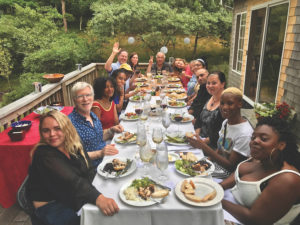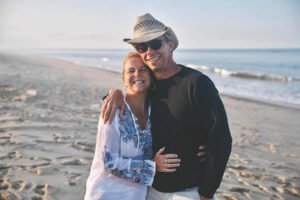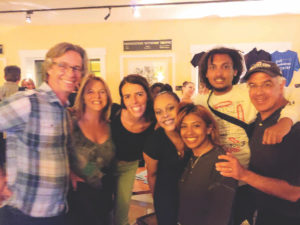WELLFLEET — Before Kathy Fletcher and David Simpson founded a nonprofit to help inner-city kids go to college, as many as seven teenagers were living with them in their three-bedroom Washington, D.C. rowhouse.
They were buying phones, laptops, and “thousands of phone chargers,” said Simpson.
Money was flying out the door $100 at a time, whenever a kid needed the sort of assist that seems like nothing until you don’t have it.
“One of our kids quit school at 16 to work at McDonalds to support his family,” Fletcher said. “When Trump got elected his mom and his sister had to go back to El Salvador. He cried all the way through dinner telling us.”

From relationships with kids like that, the couple gained a clear view of the inequalities of race and class in this country and how fundamentally simple it is to do something about it.
“There is mostly success,” said Simpson of their work. “But there is heartbreak, too.”
After several years of unofficial mentoring, Fletcher and Simpson made two key decisions: In 2016 they formed a nonprofit called AOK (All Our Kids). Simpson runs it. He quit his previous job at a nonprofit that was trying to take money out of politics. (FYI: that’s extremely difficult.)
AOK is now helping 40 underprivileged kids with college and careers. This year the couple moved to Wellfleet, where they plan to shift their organization’s focus from support of inner-city youth to running a residency retreat for emerging artists from poor and minority backgrounds.
If it sounds a bit pie-in-the-sky for two urbanites transplanted to a town of 3,000 year-round residents, you have to understand who they are and what they’ve already accomplished.

Kathy Fletcher, Warrior
Now beginning a new job at Harvard University as executive director of the world music nonprofit Silkroad, Fletcher became a social justice activist at 13. The eighth of nine children, she grew up hanging out on the docks of West Islip, Long Island alongside her six older brothers. When her father refused to allow her to work on the docks because she was a girl, she staged a public protest, and by the time she left for UMass Amherst she was first mate on the Captree Queen, an 80-foot party boat, leading an all-female crew.
After college, Fletcher organized a three-month occupancy of Pulaski Park in Northampton, for which she was jailed in the Hampshire County Correctional Institution.
“It changed my life in a great way,” she said. “I was in a cell with five other women and they were so nice to me; they protected me from the guards. They were all black or Puerto Rican.”
As a result of that protest, the Grove Street Inn homeless shelter was created in Northampton.
Fletcher also got involved in the Holyoke area in the testing and enforcement of the Fair Housing Act. Her coworkers would send a black couple to interview for an apartment and then a white couple. Invariable, the landlord or agency would choose the white couple, Fletcher said. This work eventually led to successful lawsuits against large homeowners insurance and mortgage lending companies.
After a marriage that did not work out, Fletcher moved to Washington to work for the National Fair Housing Alliance. She traveled the country doing advocacy work.
“Kathy is a warrior,” said Simpson. “She is like a dog with a bone. She won’t stop until whatever thing she is focused on is solved.”
Simpson is from Toronto and came to the U.S. by way of a commune called the Renaissance Community in Gill. His mother had fallen for a 26-year-old living there. The commune turned out to be “a den of thieves and disgusting men preying on women,” he said. Six months later they moved out and settled in Northampton. Simpson ended up opening the successful Haymarket Café in downtown Northampton in 1991 with his brother.
Simpson and Fletcher had a brief romance in 1990 and got together again 17 years later. The second time they married. Living together in Washington during the Obama years, they raised Fletcher’s son, Santiago, who was attending public schools. He would often bring friends home. One day Santiago asked if his friend James could have breakfast with them. “Of course,” Fletcher replied, and James ended up eating with them daily.
“Santi inherited Kathy’s social justice gene,” said Simpson. “His friend James had no food in his house.”
James became their first “kid,” that is, a regular at the dinner table who received their help and met their friends. Today James is a firefighter. “We’re very proud of him,” Fletcher said.
They ended up hosting dinners every Thursday night for a broad swath of kids and their own friends, including artists like violinist Joshua Bell, civil right lawyers, and New York Times columnist David Brooks.
Fletcher spent much of the Obama years directing Turnaround Arts, a program of the Kennedy Center started by Michelle Obama that brought performing arts to impoverished areas of the country. That is why to this day Fletcher gets calls on her cell phone from Usher, and why Joshua Bell visits in Wellfleet with his 1713 Stradivarius.
By integrating a circle of kids with such successful professionals, Simpson and Fletcher give “social capital” to the kids and help everyone feel less alone.

A Story About Inequality
Fletcher and Simpson are uncomfortable with their own story.
“It’s the big-hearted white person story,” Simpson said. “We hate it and the kids hate it.”
“It’s really about inequality,” Fletcher said. “It is true that if you’re born in a certain place, with a certain income level, and are a certain color you’re starting point is behind.”
“I’ve always felt I get more out of it than anybody,” Simpson said of their work.
Simpson is modest and works quietly behind the scenes, Fletcher said. Which is perhaps why Fletcher will tell anyone at their “Thursday night dinners,” which occur in Wellfleet on various nights of the week, that Simpson donated one of his kidneys to a girl who became part of their circle. This literally saved her life and occurred after Fletcher and Simpson took Medicaid to court when the insurance company denied the teenager a live donor transplant.
“This is when my warrior comes out,” Fletcher said. “I said, ‘This kid is not going to f—king die.’ ”
Now that most of their kids are in college or graduated, AOK is transitioning into its new Wellfleet iteration. Their idea of creating a young artist residency here will evolve over the next year or two, Simpson said, as they meet with other local groups and figure out how that mission fits in with other needs.
“People have been very welcoming to us,” Fletcher said. “We want to help people fulfill their missions.”



